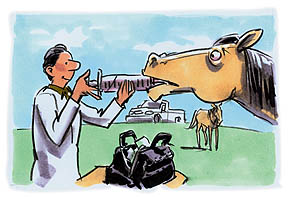| your animal. Yet you will also need
to take a close look at the animal’s living environment. If you and your horse live in a climate that is warm
year-round, then your horse will most likely be subject to worm infestations
year-round. Regardless where you live, if the stable or pasture are crowded,
your horse will have a much higher risk of infection than if it was an only
horse.
 The main problem that crowded animals face is the fact that the number of
parasites, their shed eggs and hatching larvae are so numerous that another
animal is bound to get infected. If you do have many horses on your pasture, you
will want to drag is weekly to break up the manure and let the sun kill off the
eggs and larvae; if your animals are in a crowded stable, you will want to clean
it out daily. In addition to the foregoing, a higher risk of work infestation
should be responded to with a more frequent schedule of de-worming procedures.
It is very important to follow the geographical guidelines with respect to the
creation of a proper worming schedule. Freezing winter temperatures will permit
you to only de-worm in spring and fall, whereas warm winter climates will most
likely mean that you will need to de-worm at least once a month. Another factor
that plays a large role in the de-worming schedule is the actual kind of
de-wormer you use – some will kill a multitude of worms, while others target a
specific parasite. The main problem that crowded animals face is the fact that the number of
parasites, their shed eggs and hatching larvae are so numerous that another
animal is bound to get infected. If you do have many horses on your pasture, you
will want to drag is weekly to break up the manure and let the sun kill off the
eggs and larvae; if your animals are in a crowded stable, you will want to clean
it out daily. In addition to the foregoing, a higher risk of work infestation
should be responded to with a more frequent schedule of de-worming procedures.
It is very important to follow the geographical guidelines with respect to the
creation of a proper worming schedule. Freezing winter temperatures will permit
you to only de-worm in spring and fall, whereas warm winter climates will most
likely mean that you will need to de-worm at least once a month. Another factor
that plays a large role in the de-worming schedule is the actual kind of
de-wormer you use – some will kill a multitude of worms, while others target a
specific parasite.
Foals will require special attention, since they have no natural immunity to
these parasites. At one month of age, the young horse is ready for its first
dose, and its weight will determine the proper dosage. Continue the treatment
monthly, allowing for the foal’s growth and increase in weight. A veterinarian
will be able to help you figure out which kinds of de-wormers are appropriate
for these young animals.
If your animal displays the tell-tale signs of a heavy parasite infestation,
such as a poor coat, a pot belly, or other signs of being unwell, your
veterinarian should be consulted for a fecal exam to pinpoint the kinds of
parasites at work. This will indicate the kind of de-wormer to use.
Additionally, you will need to follow your veterinarian’s advice in such cases,
since a large amount of killed worms within the horse presents its own set of
problems, such as colic and founder. As always, paying close attention to the
directions on the label is a key factor to success!
Another time that you will want to de-worm an animal is when you introduce a new
horse to your pasture or stable to reduce the introduction of any parasites to
your already existing herd. If you have a heavily crowded stable or pasture, you
may actually want to consider putting all of your animals on a daily de-wormer,
simply to keep the number of parasites that are being spread back and forth at
their most manageable levels.
Do not be alarmed if you find tapeworms in your horse’s feces. Even the horses
on strict de-worming regimens will frequently have these parasites living in
their intestines. You will be able to purchase a specialized de-wormer to get
ride of them. Keep in mind that de-worming is more than simply cleaning out your
horse’s intestines, however. There are a number of parasites that may begin
their life in the horse’s gut, but they will eventually travel to different
tissues. Working with your veterinarian will ensure that your animal will remain
healthy and comfortable.
 |